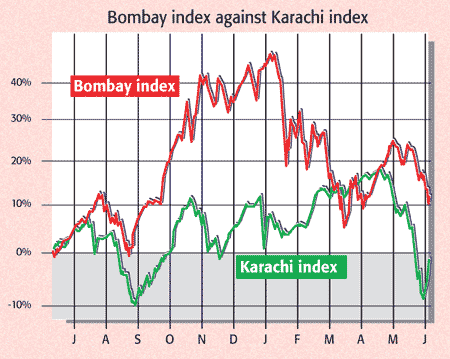
As a low-cost manufacturing hub with a highly-skilled workforce, Vietnam has long been seen as the next China. But what about the next India? Well, there’s another emerging Asian economy that speaks English, has a democratically-elected government, and boasts strong yet sustainable economic growth. With the launch of the Melchior Pakistan Fund, Dalton Strategic Partnership is betting on Pakistan, where they say investors can buy “India at half the price”.
At first sight, the investment case is compelling. The market looks cheap on a p/e of 11.5 against 16 for India’s Sensex. And in the year to 30 April, the Karachi Stock Exchange (KSE) returned 7.4% against a 15% drop for the Sensex. But that’s hardly the whole story. In May alone, the KSE fell 20%, underlining the country’s precarious political and economic situation – after all, it has only just elected its first civilian government in nine years. Inflation is at a 30-year high of 19%, food shortages are rife, and foreign investors, who pumped in $5bn during 2006 and 2007, are pulling out, unnerved by skirmishes on the Afghani border.
No need to fret, says Naz Khan of KASB Funds, which administers the new fund in Karachi. “We have locked horns with India many times in the last few decades,” he tells Reuters. “This is just a different border and it shouldn’t affect the overall economy.” But as you might expect, that’s a somewhat sanguine view. The US army never launched missile attacks on the Indo-Pakistan border, as it did this week on the Afghani one.
And with the chaos around the recent election, “there is the perception that nobody is actually in command to address the real issues and take the country forward,” Habib-ur-Rehman, CEO of Atlas Asset Management in Karachi, tells Bloomberg. Melchior is also betting on the economy growing at 7% this year, but it’s already slowed to 5.8%, and the International Monetary Fund forecasts 3.5% growth in 2008-2009.
With the outlook for the global economy uncertain, now is not the time for investors to place a large portion of their assets into such a risky basket. The fund isn’t cheap either, with a 1.75% annual fee and a 15% performance fee if it outperforms the KSE 30 index. If you really want to buy into emerging markets, try an exchange traded fund (ETF), such as iShares MSCI Emerging Markets (US:EEM), which gives broader exposure. The total expense ratio is 0.75%, and the ETF is up 23.15% from its August 2007 low.